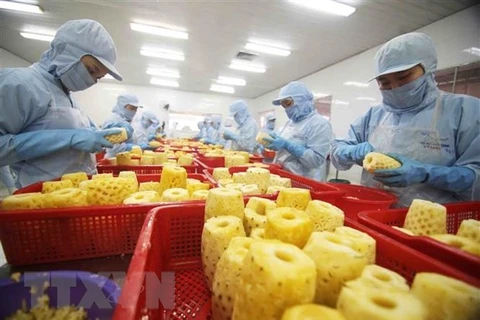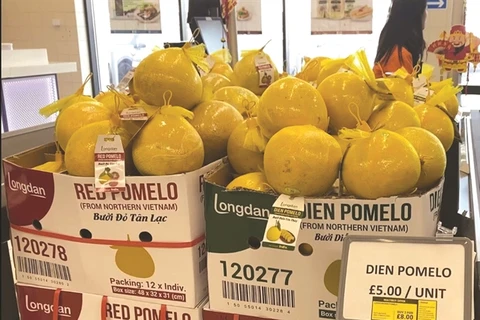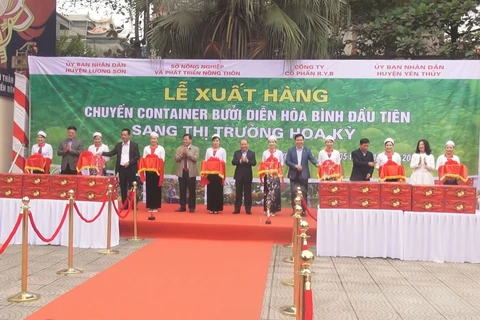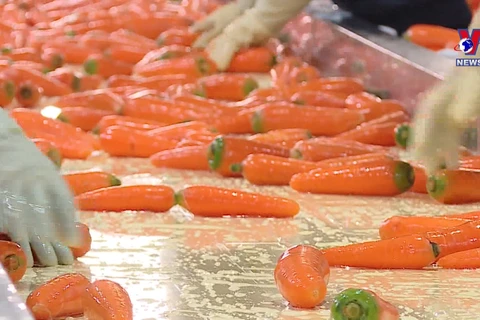Hanoi (VNS/VNA) - In light of the recent incident involving the destruction of two shipments of Vietnamese durians and peppers by the Japanese authorities, the vulnerability of Vietnamese agricultural exporters remains a pressing concern.
This risk is particularly pronounced as importing markets tighten their standards for clean and green practices, necessitating a more proactive and comprehensive approach from the sector to keep its buyers and maintain a competitive edge.
Ta Duc Minh, Trade Counselor at the Vietnamese Embassy in Japan, said agricultural export businesses entering the market must fully comply with Japanese standards, emphasising the importance of ensuring product quality and avoiding violations.
The concerns over a fast and easy mentality were highlighted by the events of October 2023, where two shipments of Vietnamese durians and peppers for Japan were compelled to be destroyed due to excessive chemical residues. The importing entity, Japan Apple LLC, suffered substantial losses, with the durian shipment alone accounting for a loss of nearly 10,000 USD. Another incident back in September involved the recall of Vietnamese unripe durians by the company.
In response to the challenges faced by Vietnamese exporters, industry experts and insiders said there is a need for vigilance and adaptation to evolving market dynamics. A report from the Vietnam Sanitary and Phytosanitary Notification Authority said that China and the EU sent 11 notifications related to Sanitary and Phytosanitary Measures (SPS) between October 21 and November 21 this year. The EU, in particular, issued 31 warnings within the first six months of 2023, primarily related to exceeding permitted levels of plant protection chemicals in agricultural products.
Recognising the pivotal role of leading supply chain entities, they warned domestic agricultural processing companies may lose orders to competitors if they keep failing to implement sustainable commitments promptly. Despite Vietnam being among the world's largest exporters of fruits and vegetables, the country's market share in the EU is currently only 0.18%, partly due to non-compliance with the bloc's standards.
Taking the black pepper industry as an example, experts voiced their concerns over the necessity for attention to global standards. By the end of November 2023, the EU had set regulations on Maximum Residue Limits (MRLs) for 513 active ingredients on black pepper grains, with the US issuing eight. As of now, only about 60% of Vietnam's black pepper producers met the residue requirements.
In the pursuit of sustainable development, experts said ongoing projects on pesticide residue should be based on EU and the US standards, along with traceability and initiatives for black pepper sources. The set target for the Vietnamese black pepper industry by 2025, 70% of black pepper exporters will meet the requirements./.
This risk is particularly pronounced as importing markets tighten their standards for clean and green practices, necessitating a more proactive and comprehensive approach from the sector to keep its buyers and maintain a competitive edge.
Ta Duc Minh, Trade Counselor at the Vietnamese Embassy in Japan, said agricultural export businesses entering the market must fully comply with Japanese standards, emphasising the importance of ensuring product quality and avoiding violations.
The concerns over a fast and easy mentality were highlighted by the events of October 2023, where two shipments of Vietnamese durians and peppers for Japan were compelled to be destroyed due to excessive chemical residues. The importing entity, Japan Apple LLC, suffered substantial losses, with the durian shipment alone accounting for a loss of nearly 10,000 USD. Another incident back in September involved the recall of Vietnamese unripe durians by the company.
In response to the challenges faced by Vietnamese exporters, industry experts and insiders said there is a need for vigilance and adaptation to evolving market dynamics. A report from the Vietnam Sanitary and Phytosanitary Notification Authority said that China and the EU sent 11 notifications related to Sanitary and Phytosanitary Measures (SPS) between October 21 and November 21 this year. The EU, in particular, issued 31 warnings within the first six months of 2023, primarily related to exceeding permitted levels of plant protection chemicals in agricultural products.
Recognising the pivotal role of leading supply chain entities, they warned domestic agricultural processing companies may lose orders to competitors if they keep failing to implement sustainable commitments promptly. Despite Vietnam being among the world's largest exporters of fruits and vegetables, the country's market share in the EU is currently only 0.18%, partly due to non-compliance with the bloc's standards.
Taking the black pepper industry as an example, experts voiced their concerns over the necessity for attention to global standards. By the end of November 2023, the EU had set regulations on Maximum Residue Limits (MRLs) for 513 active ingredients on black pepper grains, with the US issuing eight. As of now, only about 60% of Vietnam's black pepper producers met the residue requirements.
In the pursuit of sustainable development, experts said ongoing projects on pesticide residue should be based on EU and the US standards, along with traceability and initiatives for black pepper sources. The set target for the Vietnamese black pepper industry by 2025, 70% of black pepper exporters will meet the requirements./.
VNA
























